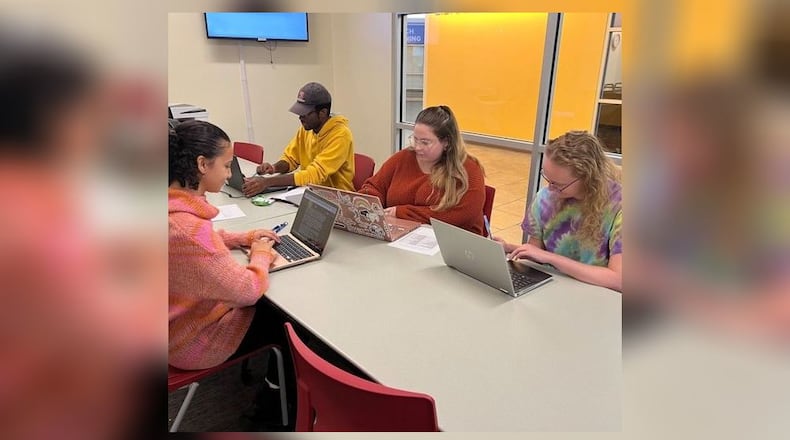“It is wonderful working with Wittenberg students. Their energy and passion for creating positive social change cannot be matched,” Wagner said. “It’s great to see them engaging in the community in a meaningful way.”
Junior Brynn Cunningham from Grove City and senior Joshua Tarrance from Cumming, Ga., are the students interning at the department.
Cunningham, who is majoring in sociology with a criminology concentration while pursuing minors in psychology, justice law and public policy, said she is grateful to have received this internship and for Wagner to “want to work with her again.”
As an intern, Cunningham completes many tasks such as creating materials for both the department and returning citizens, creating spreadsheets of data from jail entry and exits, compiling a guide for individuals coming out of prisons to show them how to use current technology and helped create many of the materials used in a lawyer clinic.
She said one of the largest tasks was the Reentry Map, which shows providers in the area what’s offered to returning citizens, such as immediate shelter, temporary housing, medical care, mental healthcare, opportunities for economic mobility and prosocial connections.
The two interns along with two other volunteers participated in a free legal clinic at the Clark County Public Library. Volunteer lawyers came to do free case reviews for Clark County justice-impacted citizens to see if they were eligible to have their record sealed or if they were eligible for a Certificate of Qualification for Employment (CQE), which lifts some restrictions from employment and occupational licensing for those with convictions.
A CQE can help bypass the restrictions of a criminal record that prohibit people from many job opportunities
At the clinic, the students analyzed cases to determine CQE eligibility and helped the individuals fill out the application, which is a lengthy process with many narrative questions. Wagner said the students “were paramount” in helping them draft responses and the team “was indispensable to the success” of the clinic.
Always knowing she wanted to work in the criminal justice field, Cunningham said her internship has helped her view the system from the perspective of those who have been justice-impacted while offering them a second chance.
“I love helping people, and I have never loved my job more than when I was working the Legal Clinic. There, I helped a client complete and submit the CQE application,” she said. “I got to talk with her about her past, what she wants to do career wise, and how she grew and learned from her past mistakes. Reentry is all about helping those who have spent time in prisons or jails come back to their community and be successful in it.”
About the Author

